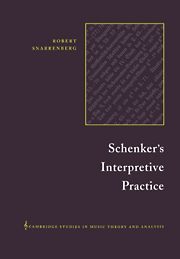1 - Effects
Published online by Cambridge University Press: 02 November 2009
Summary
Schenker never attempted a comprehensive account of all the effects that could be produced by tonal configurations. He did not do so, I expect, primarily because the repertory of basic effects is large enough to make the combinatorial possibilities enormous, probably infinite. But he did develop an astounding repertory of musical ideas that, for its scope and inventiveness of implementation, knew no precedent. Which is not to say that he did not borrow components of this repertory from other writers, some of whom he acknowledged (C. P. E. Bach and Fux), most of whom he did not (for example, Rameau, Riemann, Kurth). All of the basic concepts were part of the musical discourse that he learned from others – passing, delay, Stufe, and repetition, for instance. His ingenuity lay in realizing the possibility of extending these concepts to nonparadigmatic tonal configurations, ones more complex than simple passing tones, suspensions, vertical chords, and melodic motives. Schenker never attempted, however, a comprehensive account of all the tonal configurations that could realize these concepts, perhaps because doing so, as Joseph Dubiel puts it, would have limited in advance a domain of compositional invention. The extension of effects (their prolongation) was accomplished by means of a set of relational concepts (transformations) under which relatively complex configurations of tones can be interpreted in terms of relatively simple configurations. This, too, is not new; precedents abound in eighteenth-century composition manuals.
Information
- Type
- Chapter
- Information
- Schenker's Interpretive Practice , pp. 9 - 53Publisher: Cambridge University PressPrint publication year: 1997
